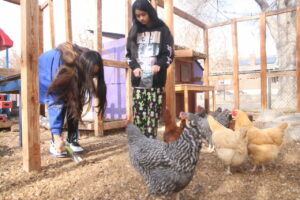By Eric Heinz
Checking for eggs and honey are not typically part of a school curriculum, but some Denver Montessori Junior/ Senior High School students are tasked with maintaining a small farm.
Kiahna Calder, who manages the facilities of the environmental science classes and subs in for the class from time to time, said the animals and farm have been part of the class for a few years.
“Somebody would go research how eggs work, how that laying process happens, how to take care of them in general,” she said. “Other kids would research garden beds and they would plan what to plant in each bed.”

Calder said the school plans to start a greenhouse in the near future, and she wants students to see the entire farm-to-table process. The farm is located on the corner of 43rd Avenue and Raritan Street.
“We want to do a full-circle culinary class that uses the eggs and stuff to bake,” she said. “They also will use the pumpkins and some tomatoes to make random stuff that they were doing in class, and then we also sell the eggs to the parents and students. Everything that we have has a purpose. Eventually, when the bees produce enough honey, that’ll go to the community.”
Calder admits she wishes the class was a little more popular with the students, especially those who are unfamiliar with agriculture.
“They don’t like doing anything out here because it’s dirty, but there are some kids, three chicken managers and three bee managers,” Calder said. “We have a worm manager, and we did have farm managers, but we dropped that. So those kids are super dedicated to learning about the bees and the chickens.”
According to an innovation plan published by the school, the purpose of the farm is to connect students to organically grown food, which can be added to the school lunch program.
“The outdoor work is physical and requires students to challenge themselves in order to complete the required tasks,” according to the school. “Because the students are working side-by-side with their friends and with an adult, the students participate generally with a positive attitude.”

Be the first to comment